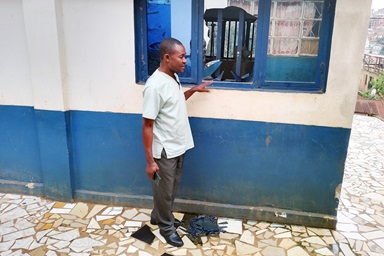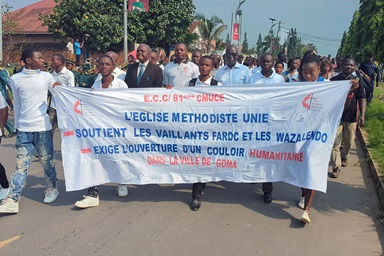Like most Christians in Pakistan, Insar Gohar can trace his family’s faith commitment back at least four or five generations.
But that heritage — spread by missionaries during British rule in the second half of the 19th century — also sets them apart in the eyes of Pakistan’s majority Muslim population, he says.
“Because Christianity came in Pakistan through the colonizers, even today the Muslims of Pakistan associate Christianity as a western religion,” Gohar told United Methodist News Service, adding that Pakistan’s Christians often are considered westerners themselves. “This is why sometimes we also face discrimination and sometimes persecution.”
Gohar, 43, who is in the first year of a three-year master of divinity program at United Methodist Claremont School of Theology in southern California, has been the youth officer for the Diocese of Peshawar, Church of Pakistan.
Since evangelism and religious conversion is difficult and even dangerous, few have publicly joined their ranks since the partition of Pakistan and India in 1947, Gohar noted. The Church of Pakistan was formed in 1970 when four denominations — Anglican, Methodist, Lutheran and Scottish Presbyterian — united to give cohesion to a very small religious minority in Pakistan.
Although interfaith dialogue does not have a long history in Pakistan, the Diocese of Peshawar has been involved with “Faith Friends,” a group that includes Hindus, Muslims and Christians. While such initiatives are not strong enough to stop religious intolerance, “They’re trying to do that,” he explained.
Twin bombs after Sunday worship
The church remains a target, however, and no one knows that better than Gohar, who lost two children and his mother when the All Saints Church in Peshawar, which dated from the 19th century, was bombed in September 2013. His wife, Uzma Insar, was badly injured.
“Even in the history of Pakistan, this was the most horrible attack on Christians,” he said.
On that Sunday morning, two suicide bombers entered the courtyard outside the sanctuary — one through the west gate and the other through the east gate — as people were leaving the worship service.
“We don’t know how they entered because the government had given us security,” Gohar recalled. “The police guards were outside both of the gates.”
Some church members were still in the sanctuary, but most had gathered in the courtyard to greet each other when the two bombs were detonated. About 100 people were killed and 250 injured — including his 79-year-old mother and their 11-year-old son and 9-year-old daughter.
The United Methodist Church and other partner churches were supportive after the blast, Gohar said, but those who survived are not so easily healed, either physically or psychologically. “The situation is very, very traumatic.”
Expressing their pain
Thomas Kemper, top executive of the United Methodist Board of Global Ministries, outlined some of that support in a paper written for a November 2015 consultation on religious persecution in Tiriana, Albania.
The mission agency’s actions have included making public statements questioning Pakistan’s blasphemy law and condemning the All Saints church bombing and the bombing of a public school in Peshawar in December 2014.
Global Ministries also provided financial backing for a World Council of Churches hearing in 2012 on the misuse of the blasphemy law and a grant toward a Church of Pakistan project to improve security in church-run schools.
“We are aware of many instances of oppression and can often be in open solidarity with those who suffer; at other times, our solidarity must be less visible because what we say or do could jeopardize communities or colleagues,” Kemper wrote.
The suffering from the All Saints bombing included widows and 36 children who became orphans, including 16 who lost both parents, Gohar said. Many of those affected by the bombing, however, continue to go to church to show they are not afraid, he added.
Although he didn’t know much about counseling, Gohar started an impromptu ministry, encouraging those affected by the tragedy to express their pain rather than keep it inside.
But Gohar and his wife also had to heal, as Rebecca Asedillo, a Global Ministries executive who related to Christians in Pakistan, pointed out to him.
After the bombing, he said, she kept sending him emails “and consoling me.”
Asedillo visited mission partners in Pakistan in February 2014, seven years after her last trip there, and noticed the continued concerns about security. “I had actually sensed a greater sense of vulnerability, even for myself,” she recalled.
Previously, such attacks had been “few and far between,” she said. “Now it’s just a normal thing, the bombings. It’s no longer news.”
A long-term response
Global Ministries authorized a grant that allowed the couple to stay at the Overseas Ministry Center in New Haven, Connecticut, in the spring of 2014 to rest and receive counseling.
During the visit to New Haven, the couple was invited to Global Ministries headquarters in New York to discuss a further plan for the church bombing response. “At that time, I shared my vision that I wanted to do the pastoral care and counseling ministry among them (the blast survivors),” Gohar said.
They also shared their story during a Global Ministries board meeting. The story reminded board members and staff, Kemper wrote later in New World Outlook Magazine, that the goal of seeking justice, freedom, and peace is a central part of mission work.
“It takes courage to be a Christian in the Diocese of Peshawar, as in Pakistan as a whole, where 97 percent of the population is Muslim,” Kemper wrote.
The plan that evolved, with the help of Global Ministries, was for Gohar to pursue a master’s degree with a concentration on counseling and pastoral care. Kemper and Asedillo brought Gohar to the attention of the Rev. Kah-Jin Jeffrey Kuan, Claremont School of Theology president, in October 2014.
Kuan had been aware of the church bombing in Pakistan. “Becky and Thomas explored with me the possibility of having Insar as a student at Claremont, especially given the interreligious focus of our theological education,” he said. “They also wanted a school that is able to provide Insar and his family sufficient financial support as well as emotional and spiritual support.”
Finding support at Claremont
Claremont School of Theology gave Gohar a full-tuition scholarship. Global Ministries has helped with living expenses for the family, which now includes a new baby, 16-month-old Aaima. Smaller grants were provided by the Los Altos United Methodist Church of the California-Nevada Conference and the New England Conference.
Gohar said that Kuan and the school’s students and staff have been very supportive. He also appreciates the love shown to his family by members and staff of Claremont United Methodist Church, where they have joined the congregation.
The seminary, he added “is giving me a depth in understanding of the theological bases as well as it is very nicely equipping me for my future ministry among my people.”
While his studies are important, Gohar and his family have “made valuable contributions to our Claremont community, Kuan noted. “The story of this family continues to inspire all of us to create a difference for the world we live in.”
For now, the family is enjoying the calm of living in a peaceful environment. But Gohar said he also is preparing himself to return to Pakistan and be in ministry “for my people who are still in grief, still in trauma.”
Bloom is a United Methodist News Service multimedia reporter based in New York. Follow her at https://twitter.com/umcscribe or contact her at (646) 369-3759 or [email protected]
Like what you're reading? Support the ministry of UM News! Your support ensures the latest denominational news, dynamic stories and informative articles will continue to connect our global community. Make a tax-deductible donation at ResourceUMC.org/GiveUMCom.





